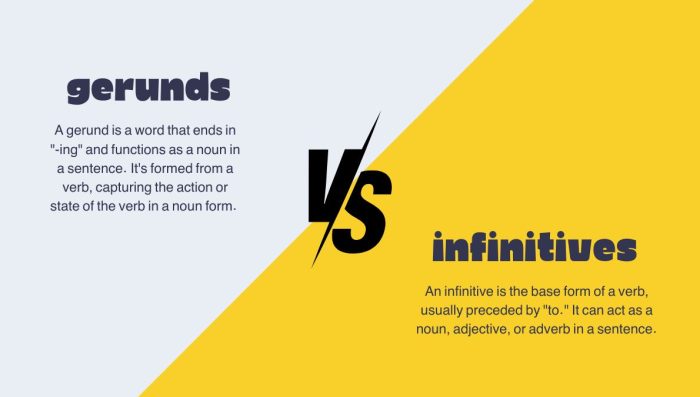Gerunds vs Infinitives

Gerunds and infinitives are special ways to use verbs in English. Gerunds end in “-ing” and act like nouns. For example, “Swimming is fun.” Infinitives are the basic form of a verb and usually start with “to.” Like in “I like to run.”
What Is a Gerund?
A gerund is a verb form that ends in “-ing” and works as a noun in a sentence. For example, in “Running is fun,” “running” is the gerund. It takes an action, like running, and turns it into a thing we can talk about.
Here are some of the basic guidelines that you can use to identify gerunds:
Example Gerund: “I enjoy writing.”
When To Use Gerunds
Use gerunds when talking about hobbies or things you like to do. They help describe your daily habits and are also good for giving advice or tips. Use gerunds after the following verbs:
- Avoid – Avoid eating late at night.
- Can’t stand – I can’t stand listening to loud music.
- Discuss – Let’s discuss going on a road trip.
- Dislike – I dislike waking up early.
- Enjoy – I enjoy baking on weekends.
- Feel like – Sometimes I feel like swimming.
- Don’t mind – I don’t mind sharing my snacks.
- Suggest – They suggest visiting the museum.
- Understand – I understand avoiding crowded places.
Use gerunds after these expressions with prepositions:
- Excited about – I’m excited about starting a new book.
- Sad about – She’s sad about leaving her hometown.
- Sick and tired of – We’re sick and tired of hearing excuses.
- Believe in – He believes in giving second chances.
- Objects to – She objects to working overtime.

Gerunds vs. Other Verb Forms
As you already know, gerunds end in “-ing” and act like nouns. But how do they compare to other verb forms?
- Present Participle – I am eating my favorite food.
- Participle Adjective – The trip was amazing.
- Gerund – I practice drawing circles every day.
Seeing how gerunds, present participles, and participle adjectives work shows us the many ways we can use “-ing”.
What Is an Infinitive?
An infinitive is the basic form of a verb that usually starts with “to,” like “to play” or “to see.” Infinitives are useful because they help us express ideas in a simple way. They can tell us why something happens, like “to get a good grade,” or what someone wants to do, like “to travel the world.”
Here are some of the basic guidelines that you can use to identify infinitives:
Example Infinitive: “I want to write.”

When To Use Infinitives
Infinitives are perfect for expressing a purpose or reason behind an action. They also come into play when talking about likes and dislikes. For example, “I love to read” or “He hates to wake up early” are clear and direct.
Use infinitives after the following verbs:
- Agree – They agree to meet at noon.
- Be sure – Be sure to check the weather before you leave.
- Choose – She chooses to study abroad for a semester.
- Decide – We decided to start our own business.
- Expect – I expect to hear from them by tomorrow.
- Hope – He hopes to visit Japan next year.
- Learn – You’ll learn to appreciate the little things in life.
- Would like – I would like to order the steak, please.
When To Use Both Gerunds and Infinitives
Some verbs let you use either a gerund or an infinitive right after them, and it doesn’t change the meaning much. For instance, saying “I like swimming” or “I like to swim” both show you enjoy the activity of swimming.
When talking about what you prefer to do, like saying “I prefer reading” or “I prefer to read,” both ways work fine. The difference is really small, more about how the action is viewed than what the action is.
Use either gerunds or infinitives after the following verbs:
- Begin
- Continue
- Like
- Hate
- Love
- Prefer
- Start
Example Gerund: I love learning about our world.
Example Infinitive: I love to learn about our world.
Gerunds vs Infinitives
Gerunds and infinitives are both important in how we talk about actions. Here’s a recap of when to use gerunds and infinitives.
| Sentence | Gerund | Infinitive |
| I feel like going to see a comedy this evening. | ✓ | |
| We hope to study Spanish in school next semester. | ✓ | |
| She decided not to go to the mall after school. | ✓ | |
| He dislikes watching horror movies when he is home alone. | ✓ |
So, remember. Gerunds, which end in “-ing,” are good for mentioning activities, like hobbies. Infinitives, which start with “to,” are great for talking about what we want to do or why we do something.
Nominalization in English is when we turn other words, like verbs or adjectives, into nouns. Sometimes you can use either without changing the meaning much.
Do you have any questions about gerunds and infinitives? Don’t hesitate to ask in the comment section below. And remember, if gerunds and infinitives were in a race, the infinitive would say, “To finish,” but the gerund would be “running” the whole time.
